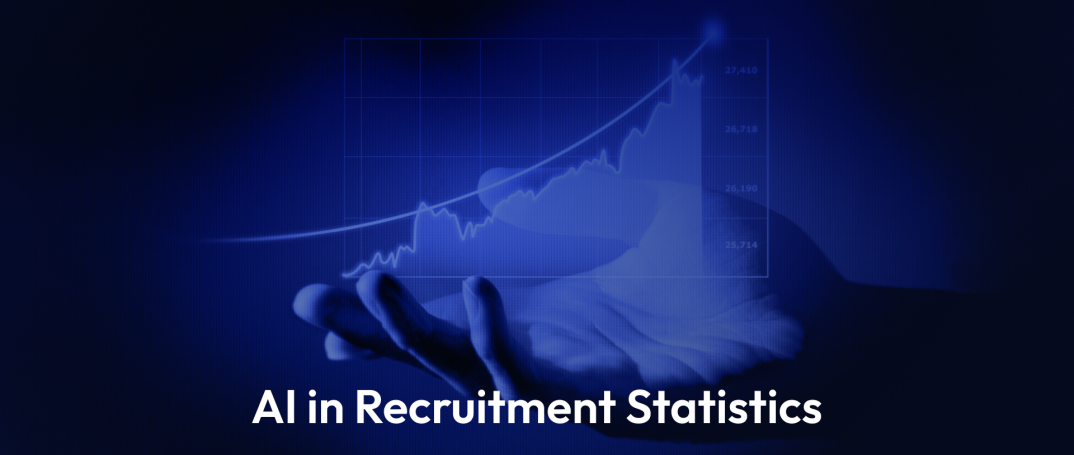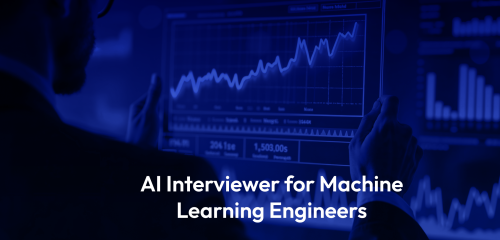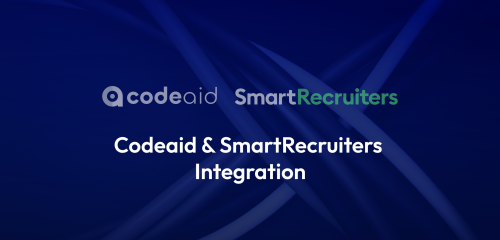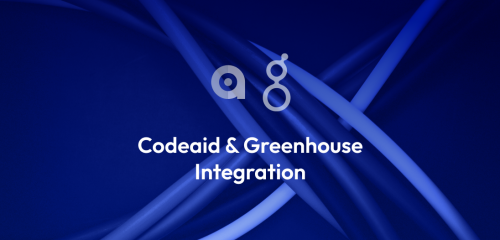Artificial Intelligence (AI) is revolutionizing recruitment processes across the globe, fundamentally changing how organizations attract, evaluate, and hire talent. In fact, 88% of companies worldwide now utilize AI technology in HR and recruitment, showcasing its far-reaching impact.
So why are all eyes on AI?
AI’s adoption is driven by the pressing need for faster, more efficient hiring processes, unbiased decision-making, and enhanced candidate sourcing. Traditional methods often fall short in meeting these demands, making AI an invaluable tool for HR professionals.
From resume screening and chatbots to predictive analytics and interview scheduling, AI’s applications are as diverse as they are transformative. These technologies streamline recruitment workflows, reduce administrative burdens, and create personalized candidate experiences.
Keep reading to uncover key AI in recruitment statistics, where we’ll discuss everything from market size and efficiency to challenges and future expectations.
Adoption of AI in Recruitment
While the term “artificial intelligence” was coined in 1955, it wasn’t until recently that it began to make a significant impact on HR and hiring processes. Today, AI has proven to be a valuable tool in recruitment, offering solutions to long-standing challenges in hiring and talent management.
Statistics:
- AI Adoption: 55% of companies are increasing their investment in recruitment automation this year.
- Generative AI: 34% of HR leaders in a study reported exploring generative AI use cases and opportunities.
- AI in Recruiting: In 2024, the top usage (55%) of AI in the recruiting process in North America was candidate matching.
AI’s growing presence in recruitment highlights its potential to redefine traditional HR practices. As more organizations adopt AI tools, they gain access to faster, more efficient processes and valuable insights, paving the way for a future where AI is integral to both hiring and ongoing talent management.
Market Size and Growth
The global AI in recruitment market is growing rapidly as organizations adopt innovative tools to optimize hiring processes and enhance talent management. This growth reflects a broader trend of digital transformation in HR, driven by the need for efficiency and precision in recruitment.
Statistics:
- Global Market Size: The global AI recruitment market was valued at approximately $661.56 million in 2023.
- Projected Growth: The global AI recruitment market is expected to reach $1119.80 million by 2030.
- Enterprise Sector Growth: The enterprise sector of AI recruitment is projected to grow at a CAGR of 6.8% between 2023 and 2030.
The steady growth of the AI recruitment market signals its transformative impact on how organizations attract and manage talent. As investments in AI technology continue to rise, the industry is poised to redefine recruitment processes, making them more data-driven and scalable for businesses of all sizes.
Efficiency and Effectiveness
One of the biggest draws of using AI in recruitment is its ability to deliver faster, more effective results. By leveraging AI’s capabilities, organizations can accelerate hiring timelines, improve candidate sourcing, and enhance decision-making, making it an indispensable tool in modern HR practices.
Statistics:
The efficiency and effectiveness of AI in recruitment are evident in its ability to save time, speed up hiring processes, and enhance candidate sourcing. These benefits not only reduce administrative burdens but also allow recruiters and decision-makers to focus on strategic aspects of hiring.
Perceptions and Attitudes
As AI becomes more integrated into recruitment processes, perceptions and attitudes toward its use vary widely. While many HR professionals embrace AI for its efficiency and effectiveness, public skepticism and concerns about fairness remain significant challenges.
Statistics:
These statistics reveal a stark contrast between the enthusiasm of HR professionals and the apprehension of the general public. Addressing these concerns—particularly around transparency and bias—will be crucial for fostering trust in AI-powered recruitment.
Concerns and Challenges
While artificial intelligence is transforming recruitment processes with its efficiency and precision, it is not without its challenges. Organizations and recruiters face hurdles in integrating AI and addressing its potential limitations, raising important questions about its role in hiring.
Statistics:
- Security: Only 39% of U.S. adults believe current AI technology is safe and secure.
- Ethical Standards: 56% of executives are uncertain whether their organizations have established ethical standards for using generative AI.
- Lack of Knowledge: 36% of companies report that insufficient knowledge about recruiting tools poses a challenge in adopting AI solutions.
AI in hiring statistics highlight significant challenges, such as technical difficulties, compliance concerns, and a lack of knowledge about recruiting tools, which organizations must address to fully leverage AI’s potential. Overcoming these barriers requires careful planning, ongoing education, and collaboration to ensure that AI solutions are implemented effectively and ethically.
Future Expectations
AI is expected to redefine the recruitment landscape, introducing innovative methods to enhance efficiency and decision-making. With its growing influence, AI is set to take on more significant roles in hiring processes, blending automation with human oversight to meet evolving expectations.
Statistics:
- AI Adoption: 78% of employers believe human resources will gain significant value from AI adoption.
- AI’s Future Role: 62% of Americans think the use of AI in the workplace will have a major impact on workers generally over the next 20 years.
- AI Decision Acceptance: 31% would agree for AI to decide whether they get hired, 75% if there’s human involvement.
AI’s transformative capabilities in recruitment signal a shift toward more efficient, data-driven practices, aligning with emerging AI recruiting trends that emphasize innovation and effectiveness. However, its future success hinges on striking the right balance between automation and human involvement. By fostering trust and ensuring transparency, AI is set to redefine recruitment while addressing the complexities of ethical decision-making.
AI Tools and Applications
AI is enhancing recruitment processes through a variety of specialized tools designed to address specific challenges. From advanced coding test platforms that assess technical skills efficiently to chatbots that streamline initial communication, AI applications are becoming indispensable in modern hiring strategies.
Statistics:
AI tools and applications are redefining recruitment by automating tedious tasks and improving efficiency across every stage of the hiring process. Whether it’s through resume screening, chatbots, or interview scheduling, these tools allow recruiters to focus on building meaningful connections with candidates while leveraging technology to save time and resources.
AI and Diversity
Artificial intelligence is playing a growing role in fostering diversity within recruitment processes. By automating candidate evaluation and leveraging data-driven insights, AI offers the potential to reduce unconscious biases and expand opportunities for underrepresented groups.
Statistics:
- Fair Hiring: Roughly half (47%) say AI would be better than humans at treating all applicants similarly, while just 15% say it would do a worse job.
- Exclusion of Unique Talents: 35% of recruiters are concerned that AI could lead to overlooking unique and unconventional talents.
- Bias Reduction: 43% believe that a key benefit of using AI is that it removes human bias.
AI in recruitment statistics reveals its growing influence in fostering diversity and inclusivity in hiring processes. While AI demonstrates significant potential to reduce unconscious bias and improve diversity outcomes, concerns about fairness and the exclusion of unique talents highlight the need for careful oversight. Balancing technological advancements with thoughtful implementation will be key to ensuring equitable and effective recruitment practices.
AI in Candidate Experience
From streamlining communication to personalizing engagement and reducing response times, AI tools are enhancing the efficiency and accessibility of the candidate experience. These technologies allow candidates to receive faster feedback and tailored support throughout the hiring process, creating a more positive and inclusive journey.
Statistics:
- Response Times: About 70% of applicants mentioned reduced response time as a significant advantage of using AI in HR.
- Candidate Acceptance: 81% of candidates would be willing to work with an AI-powered recruiting assistant if it sped up the process.
- Transparency Desire: 79% of candidates want to be informed if AI is used in the hiring process.
AI in hiring statistics highlight its potential to improve the candidate experience by streamlining processes and increasing engagement. However, with transparency becoming a priority for candidates, organizations must ensure clear communication about AI’s role in recruitment. Thoughtful integration and alignment with candidate expectations can help businesses foster trust and deliver a more seamless and rewarding hiring journey.
AI and Productivity
AI enhances productivity in recruitment by taking over routine tasks, such as interview scheduling and data management. This shift enables recruiters to prioritize strategic efforts, like candidate relationship-building and talent evaluation, ultimately creating a more efficient and focused hiring process.
Statistics:
- Recruiter Productivity: AI increases recruiter productivity by 60%.
- Time Savings: 89.6% of respondents feel that using AI significantly or somewhat sped up the period between posting a job and making an offer.
- Overall Productivity: Employers believe AI could boost overall productivity by as much as 49%.
AI enables recruiters to save valuable time, focusing their efforts on meaningful tasks like candidate engagement and talent evaluation. By balancing efficiency with relationship-building, AI demonstrates its potential to streamline the hiring process and deliver better results for both recruiters and candidates.
Conclusion
AI in recruitment statistics highlight its transformative potential, showcasing key benefits like time savings, diversity enhancement, and more inclusive hiring outcomes. These gains reflect the broader AI hiring trends that position AI as a game-changer in modern talent acquisition.
However, ethical and technical issues, such as bias concerns, remain significant. As the AI recruitment market continues to expand, addressing these challenges will be critical to fully realizing AI’s potential.
Looking toward the future, innovations like generative AI and predictive analytics are projected to redefine hiring processes by 2030. These tools will not only streamline recruitment but also create opportunities for more data-driven, equitable practices.
We encourage you to explore how your business can leverage AI in the hiring process to reduce inefficiencies, enhance diversity, and remain competitive in a dynamic talent landscape. By thoughtfully aligning with these AI recruiting trends, businesses can unlock new possibilities for success in recruitment.
Codeaid offers AI Interviewer Software to help you navigate this transformation, featuring solutions like skill-based question generation, CV insights, and real-time candidate evaluation powered by AI.
Sign up today to discover firsthand the advantages of using AI recruiting tools.



